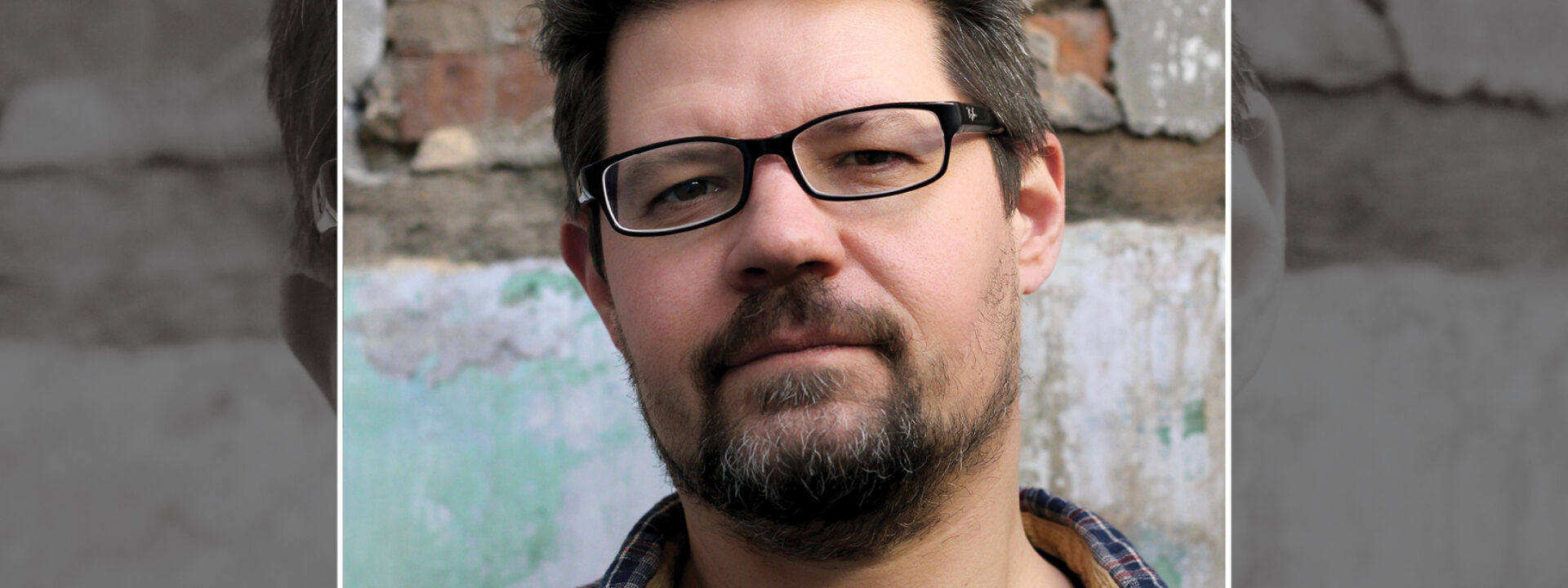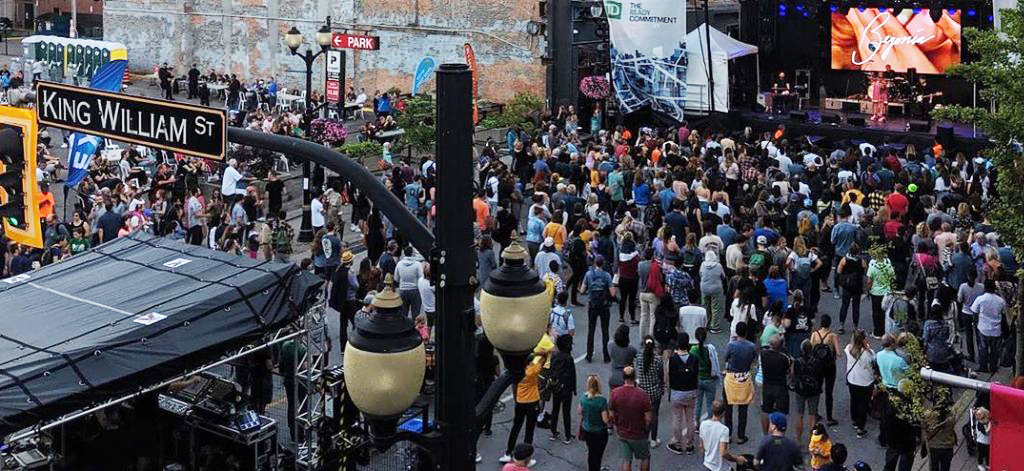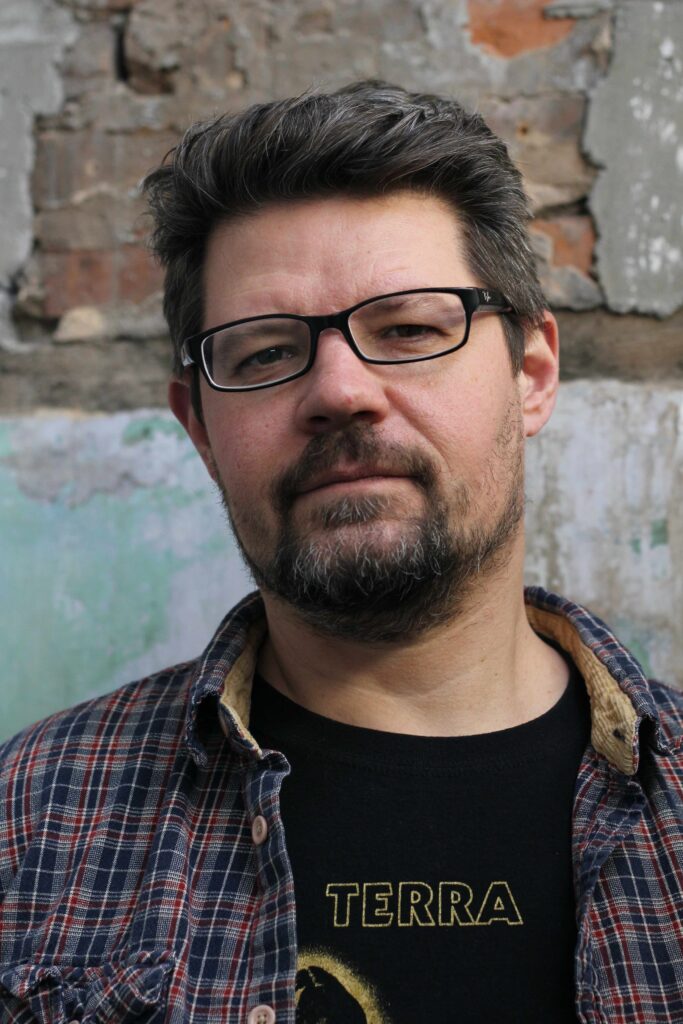City View: Tim Potocic is making beautiful music

Owner/president of record label Sonic Unyon and the driving force behind Supercrawl, Because Beer Craft Festival and venues Bridgeworks and Mills Hardware, Potocic is also among the local pioneers who invested in Hamilton’s downtown long before it was cool to do so.
Tim Potocic was born in Burlington and grew up in Dundas and Hamilton. One set of grandparents owned the Picton Tavern in the North End and as a youngster, he spent weekends there, helping out and fooling around on the drum kits. When he got older, he would often hop on the bus to head downtown to visit the dozen record stores. After high school, Potocic was a drummer in indie band Tristan Psionic when some band members started a record label called Sonic Unyon as a means to distribute their record. That was almost 30 years ago. Since then, he’s helped to launch Supercrawl, Because Beer Craft Festival, and opened event spaces in Mills Hardware and Bridgeworks. Potocic lives in the Durand neighbourhood.
Sonic Unyon Records will be 30 years old next year. What does that feel like?
Well, time sure flies. I’m still loving what I do in this business. There is constant evolution and it’s been a great ride. We’re working on expansion plans on the label side. We’ve signed a bunch of new bands, newcomers and bigger bands like Danko Jones and Big Wreck. We’re excited about the music we’ll be putting out.
It seems like the independent community has really opened up. Everyone wants to work with independent labels now. With the major labels, you get one shot to make it work and by make it work, I mean be a star. I think in terms of longevity, we do a lot of different things. It enables a network and potential collaborations on the label and live music side. We did have a distribution business, which we don’t have any longer, but that opened a lot of doors. Then we own real estate, too. So, if the label has a down year, live might be strong. We’ll be releasing more albums this year and next year than we have in more than a decade. We have 12 albums going out this year and a lot of our artists are out on tour now.
You started Supercrawl in 2009. Could you have ever anticipated what it has grown into?
We never imagined it. We just kept moving forward with it and it evolved with the audience. It was the perfect storm, the right content, the right place, the right time. We knew there was demand in Hamilton for an urban street festival, James Street North was coming back and we got great support from those who were part of that turnaround. It was a semi-educated experiment and it worked and we just worked on making it better every time out. We brought together music, fashion, theatre, art, writers, food trucks, vendors so that all of these elements were feeding off one another. We’d like to continue to bring new elements of the city into Supercrawl.

From your viewpoint, what is the best thing that has come out of Supercrawl for the city?
The best thing out of Supercrawl is that it has helped on some level to get Hamilton on the map as a cultural centre. It’s added to the infrastructure of the great things already happening in this city. It’s also helped on some level with the redevelopment of the downtown. Seeing tens of thousands of people downtown on the streets allowed people to see the opportunity. It opened some eyes. And artists that we’ve booked have built an audience here and now Hamilton is a necessary stop for them.
Who are some performers and acts to watch from Hamilton?
I could say all of ours, but that would be too obvious (laughing). There are definitely some interesting artists that I’m a big fan of in town outside of the ones we work for directly who I’ll always be here to support. For example: Terra Lightfoot. I’m so passionate about her abilities and career and I want to elevate her up a few notches on the ladder. Her new record is over-the-top good and I’m really excited for her to be touring the world for this album, starting in the next 18 months to two years. We recently re-signed Danko Jones: we put out a Danko record last year, got another one this year. I’ve also been a big fan of the Dirty Nil since they started. They stuck to their guns the whole time and have just been pounding out rock songs and they have their own vibe. I’m a massive fan and try to go to as many of their shows as possible. They’re super fun and though they’re serious about their art and career, they don’t take themselves too seriously and are great people.
Also, the Red Hill Valleys: I’m not a country fan at all, but I don’t see them as a country band. They write great songs and keep at it, working really hard at what they do. There are so many good acts in the City right now. One of my favourite acts that wasn’t originally from Hamilton but recently moved here is Elliott Brood: amazing people who’ve been at it a long time and continue to hone their craft and write great tunes.

You have invested in a number of downtown properties, starting in 1996, when very few people saw promise in Hamilton’s core. What kind of vision did you see for the city then and what do you see now? How many properties do you and your partners own now?
We have 10 properties with various partners. We’ve been in the right place, at the right time and got lucky. These properties weren’t being utilized and the prices were right back then. At the time, foot traffic was up and we invested knowing that we wanted to provide things for people to do. This was such a vibrant city when I was a little kid. The streets were busy, there were so many mom and pop stores. But we just got hammered in the ’80s. It was still hard to get bank loans when we started buying in the ’90s. You needed massive downpayments but if you had businesses and tenants lined up, you could make it work. Now, there are cranes on the skyline and condos being built. That brings people to the streets to eat and shop. But there is a lot of work to do to bring the mom and pops back to the core. Small business is so critical. We have to ensure it can come and thrive.
Your email signature has a lot of components to it: Sonic Unyon and the artists you manage, Supercrawl Productions, Because Beer, Mills Hardware; Bridgeworks. How do you juggle it all?
We have a great team and we are building it bigger now. We’ve had a mandate over the last year to fill gaps and invest in people. I’m not as involved in day-to-day as I was, so that allows me to focus elsewhere. We want to grow the business significantly. Opportunities abound, so we are building the live business, signing more artists, developing more events through exciting venues. I’m spending a lot of time investigating opportunities. We had a smaller complement before COVID and that allowed us to keep everyone employed but since the pandemic we’ve almost doubled our staff. We now have 10 full-time staff and more than 30 part-timers.
What’s your ideal way to spend a lazy day in Hamilton?
I love to get up early to get a bike ride in and then hang out with friends in the backyard. We have a few drinks and talk about politics, which always gets me going.
What’s the best meal you’ve eaten in the city?
That’s really hard to narrow down. My go-to is Shenai and August 8. I love Rapscallion and The Mule, Aberdeen and The French. We have such incredible food in this city.
What is Hamilton’s best-kept secret?
People don’t realize how awesome this city is in terms of nature. We’ve got the greatest trail system in southern Ontario. I’m a cyclist and in 10 minutes, I’m riding in beautiful countryside or at one of the great conservation areas here. Our waterfront is spectacular too. It’s a really unique place.
You held the first Why Not Wine festival in May? How was it?
It went great! We’ve been having a lot of success with launching new brands and coupling them with what we know is already successful music programming. We’re using our venue at Bridgeworks as a jumping off platform for these smaller events that take place over a couple of days, then after they get more traction, we move them outside to a proper park or event space so we can add vendors and increase the size. It’s given us an opportunity to build these events to 1,000 or 1,500 people depending on how many days we do. We can have success building them without the exorbitant cost of risking starting with a bigger event outside. It’s the model we’ve always used, but we’re lucky that we have a venue like Bridgeworks to do it in now, whereas before we would rent venues to try to grow events.
It’s really expensive to try to roll the dice and start a new outside festival event. People think it’s easy, I’ll be honest: there’s lots of people who see what we do and think “Hey, I can do that! This is really simple. Pop up some tents, get some vendors, and 8,000 people will just show up!”. You have to start them small and build them up. Bridgeworks allows us to do that without having a debt.
Because Beer has been building for eight years. We’re lucky because we had some really good success right out of the gate, but it was challenging. We lost money the first year, the second year we broke even, and the third year we made money. You really won’t make profit until the third year, and you can’t have these grand expectations that everyone’s gonna show up. When your event is tested, people are comfortable, word of mouth spreads ,and your marketing permeates a little deeper, that’s when success starts to happen.
You’re having a major impact on the city’s musical events scene. What is your vision for the musical arts in Hamilton moving forward?
We’re here to support it, for sure. We’re embedded in this community so we feel very deeply about it. I saw a massive gap in what kind of programming is happening in this city. There are some really good bookers like Gasworks, Casbah, Corktown, and FirstOntario. These are the bigger players in town with the bigger venues, and great things happen there, but they’re all happening in a silo. There was a time when it was consistent, but back then music events like these was largely City-run, and incurred City debt. We’re music-focused, for the most part, though we have a non-music events, like weddings. A few folks have told us they want to get married at Bridgeworks.
The geographical landscape in Hamilton has changed for music, the population has changed, and we’re seeing different faces at different shows along with the familiar faces who’ll always come out to support great music at this level. We know we’re doing a good job of getting our marketing out to a deeper community.
You can’t rest on your laurels: you’ve got to keep building, and we’re going to keep plugging away at what we do. I want to do some bigger shows in town, so I’ve been setting the groundwork for being able to do those kinds of things. We’d love to scale up to another size venue at some point, and conversations to do that are in the works, but nothing’s firmed up yet.
Bigger plans are on my radar, though. We have free festivals, ticketed festivals, small and big venues, and we cycle artists around town, starting at venues like Mills Hardware and then scaling them up to bigger shows.
We do Canadian acts, but I want to attract American acts who wouldn’t normally come here. That’s my big project in 2024 is to get U.S artists who’d normally go to Toronto for their Canadian dates to come to Hamilton.
As a patron of music yourself, what’s your most memorable music experience of the last year?
Sunny Day Real Estate at St. Andrew’s Hall in Detroit. They haven’t put out new music, but they’re doing a reunion tour. Incredible, killer band: your readers should check them out if they haven’t already, because they are one of the best. The OG bass player for the Foo Fighters, Nate Mendel, and William Goldsmith (the former drummer for the Foo Fighters for a year and a half) are part of the act. I’d tried to get them to come to Hamilton but the routing wasn’t going to work. Their agent told me that they weren’t doing a Canadian show at first, but then all of a sudden they booked the Danforth Music Hall in Toronto, so I went and saw them there, too. But that Detroit show was better. I enjoyed it a lot. They did their whole set, came back, did their encore, and at the start of the second song of the encore, the power went out on the whole block. That was the end of the show. They left the stage and came back when everyone found out what was going on (it wasn’t the venue, but the city utility itself), and they were like “Uh, thanks for coming?”. It couldn’t have ended better.
By the time this is published, it’ll be mid to late summer. Standing here at the end of May, what are you most looking forward to for this summer?
I’m looking forward to the Because Beer Festival in July. I can’t wait. I think we’ve got a great lineup and we’ll be pushing the marketing really hard over the next eight weeks to get a record sales target. We did very well last year, but we’d love to amp it up a bit and as such, this summer we have an insane work schedule.
We’re very busy up to the end of June, then we have a little buffer where staff can take holidays, and then it’s going to be bonkers for the rest of the year: Supercrawl, the Canadian Country Music Awards, producing the Polaris Prize in Toronto, and then we have the Grey Cup in November. That’s on top of about 150 shows we have booked in the fall. The staff and I are all really excited about the months ahead, and we’re all keen to knock it out of the park.
You became chair of the Canadian Independent Music Association in December 2019. We all know what happened a few months later. Can you reflect on what the pandemic meant for the independent music sector and where we are now?
The pandemic kicked the shit out of the entertainment business that relied on live. Live-streaming worked well for a time but then that really trailed off. We got through it by applying for government funds that were available and holding limited capacity shows. It’s been slow to recover. Hamilton has always been a last-minute audience. If it’s a highly desirable show, tickets will go fast. But other shows drag. There is a lot of risk in what we do. You can’t always win right out of the gate. Shows with an older demographic have been very challenged. That audience is not coming out. At the club level, it’s really difficult. We expect it to come back but it's challenging financially right now. We are being more cautious about what we offer. We can’t afford to lose any more live music venues in this town. I hope to see others come along but the reality is the smaller-sized venues are very challenging.
Supercrawl is a Keychange associate festival, dedicated to achieving gender balance among onstage talent and a signatory of the Breaking Down Racial Barriers Declaration, committing to end anti-Black racism in the Canadian music industry. Where are we on those two fronts?
There is definitely work being done but it’s a long haul. There are a lot of natural barriers that are there. There is a real concerted effort to push the envelope but it’s hard to make progress.
Can we go over some other numbers: how many artists Sonic Unyon has represented; how many albums those artists have released; how many Junos they’ve won; number of artists at Supercrawl?
Sonic Unyon manages four artists and has about 200 albums in our catalogue. We have about 15 active acts. Our artists have won two Junos and been nominated for many more. We’ve also won many tourism awards and Canadian Music Awards. We won the very first Polaris Prize with Owen Pallett. We’ve been given heritage awards on our properties. Supercrawl has featured more than 1,000 artists and we are now offering events all year to expand the reach.






